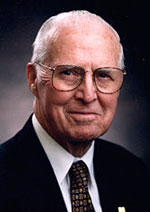|
1. The world can feed more of its people, thanks to Norman Borlaug, father of the "Green Revolution"

| Norman Borlaug, a U of M alumnus, won the 1970 Nobel Peace Prize for his research into increasing food production in Third World countries.
(Photo courtesy Norman Borlaug University)
|
University of Minnesota alumnus Norman Borlaug, the father of the "Green Revolution," won the 1970 Nobel Peace Prize for his efforts to increase food production in Third World countries. One observer credits him with saving more lives than anyone who has ever lived.
Borlaug, a native of Cresco, Iowa, earned degrees in forestry and plant pathology at the U in the late 1930s and early '40s. In 1943, Borlaug began working for the Rockefeller Center. He was sent to Mexico and began researching new strains of wheat which could thrive in a wide variety of conditions and yield more grain per acre. Borlaug and his colleagues developed various dwarf varieties of wheat - which could withstand higher levels of fertilizer, were more resistant to disease, and produced double the yield per acre. These wheat varieties were introduced in India and Pakistan in the 1960s, and many other countries in later years.
The development of high-yield wheat meant these countries could produce enough food to feed their growing populations. Borlaug's research came at a time when many were predicting massive food shortages in Third World countries would lead to mass starvation.
The Nobel Prize committee awarded Borlaug the 1970 Nobel Peace Prize, saying that his efforts to feed hungry people led to greater stability in those countries, and ultimately created the possibility for a peaceful future for all the world.
The Nobel committee expressed Borlaug's contribution this way:
"This will be the responsibility and challenge to be faced by the political authorities in the countries concerned. Through his scientific contribution and his tremendous talent for organization, Dr. Borlaug has introduced a dynamic factor into our assessment of the future and its potential. He has enlarged our perspective; he has given the economists, the social planners, and the politicians a few decades in which to solve their problems, to introduce the family planning, the economic equalization, the social security, and the political liberty we must have in order to ensure everybody - not least the impoverished, undernourished and malnourished masses - their daily bread and thus a peaceful future. And this is precisely where Dr. Borlaug has made his great contribution to peace."
Borlaug expressed that same sentiment in a speech he gave in 1970:
"I've worked with wheat, but wheat is merely a catalyst, a part of the picture. I'm interested in the total economic development in all countries. Only by attacking the whole problem can we raise the standard of living for all people in all communities, so that they will be able to live decent lives. This is something we wish for all people on this planet."
Dr. Borlaug has continued his research and advocacy of more efficient agronomy for the past three decades. He has collaborated with former President Jimmy Carter and Japanese philanthropist Ryoichi Sasakawa, to create the Sasakawa Africa Association, which is committed to increasing food production in Africa.
Dr. Borlaug helped create the World Food Prize in 1987, which recognizes the achievements of individuals who have advanced human development by improving the quality, quantity, or availability of food in the world.
In conjunction with DuPont, Borlaug has created a scholarship program to assist students in the areas of food science and production.
Dr. Borlaug, now 86, is Distinguished Professor of International Agriculture at Texas
A & M University, where the Norman Borlaug Center for Southern Crop Improvement is named after him. He is also president of the Sasakawa Africa Association.
Related Links:
Atlantic Monthly article: "Forgotten Benefactor of Humanity," January 1997
Norman Borlaug lecture: "Feeding a World of 10 Billion People: The Miracle Ahead," May 31, 1997
|